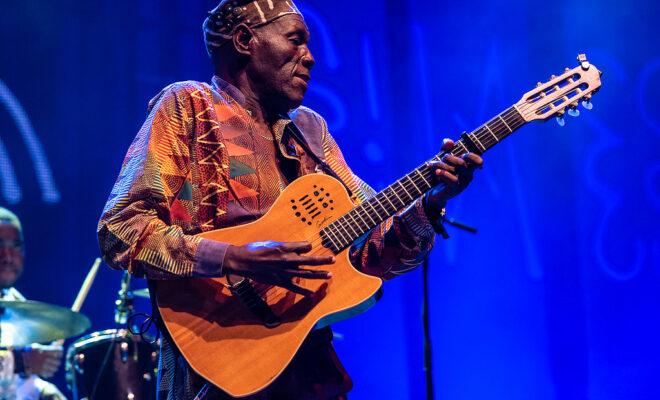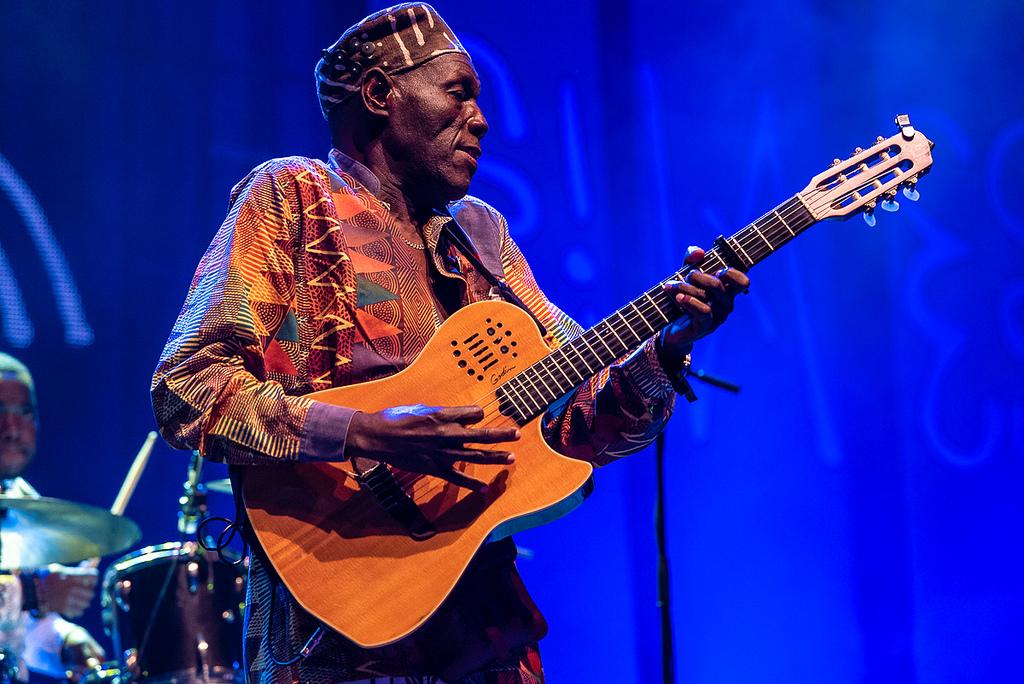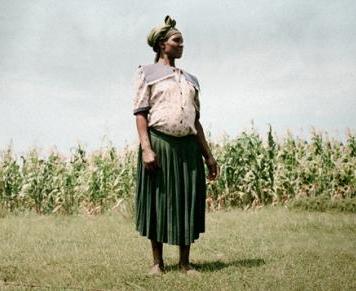Rest in Power: Oliver Mtukudzi, music legend and pan-African trailblazer

“Tuku” used his powerful poetic voice to change whole systems, forge global connections, and advocate for justice, freedom and the oppressed.

Oliver “Tuku” Mtukudzi performing in 2018. Credit: Mário Pires.
Where does one begin when paying tribute to a figure who is, at once, a recently-departed soul but simultaneously a living, breathing and immortal legend?
One could begin with his illustrious career. Oliver “Tuku” Mtukudzi released a discography of 60-odd albums, sold out shows across the globe, and picked up dozens of awards and accolades. He created a music that metamorphosed from gospel, to soul, to a genre of its own we now know as “Tuku music”.
Alternatively, one could start with the man behind the legend. Mtukudzi was a deeply humane being, who lived a life of love for mankind and gave selflessly. He experienced love unbound – as illustrated by his dedication to his wife Daisy in “Svovi” – and found meaning in family as his tribute “Ivai Navo” showed. This devotion was clear in his struggle after the death of his son Sam and in his song “Seiko Mwari”, which he described as one of “utter despair or fatalism, a deep cry full of pain and helplessness, a heartrending plea for solace and comfort”.
One could also begin by describing Mtukudzi’s deep connection to his roots, language and culture whose positives he openly celebrated and whose negatives he fiercely challenged. His use of Shona was a powerful assertion of his identity, and he used the language to weave deep lyrical thoughts on people, society, relationships and conflict. “Dada nerudzi rwako, chimiro chako nedzidza rako, pembedza rurimi pwere dzigoyemura,” he sang. (“Be proud of your tribe, your stature, and your language, promote your language so the young ones may draw inspiration from it.”)
Or perhaps one should focus first on what he meant to others. “Tuku” was a mentor who nurtured the dreams of so many young artists, building them a home to grow their talent at his Pakare Paye village and art centre. He was an ambassador for Zimbabwe, carrying the flag high at concerts and festivals, a source of pride and patriotism for many even in the midst of economic turmoil and political strife. He was a Pan-African trailblazer, linking country to country, peoples to peoples, culture to culture, language to language. Through his many collaborations with African artists – from Hugh Masekela in South Africa, to Jamaican reggae band Morgan Heritage, to Mali’s Habib Koite – he forged deep connections that transcended the unholy brotherhood of stolen elections, repressive regimes and poor governance with which African leadership has come to be identified.
Mtukudzi’s spirituality was the anchor of his life philosophy. He believed in a higher being muridzi (“the owner of everything”) who created all things equal as he sang in “Chiri Nani”. In the poignant Swahili-Shona duet about self-discovery with Tanzanian artist Lady JayDee, he sang “Mini ni mimi,” (“I am who I am”).
“Where it hurts the most”
There are many places to begin. Mtukudzi was all at once an artistic, political, conscientious, activist and poetic voice – one that resonated across the globe and influenced attitudes, norms, laws and whole systems. His politically-conscious lyrics were part of discourse across the continent. Tuku’s message, through his music, was unwavering; he strived and fought for a more just world.
He used his voice to subvert the colonial government and disseminate messages of hope in the fight for liberation. In post-colonial Zimbabwe, he wanted politicians to understand their role as leaders rather than rulers. That meant driving an agenda of social justice and equity rather than perpetrating corruption and oppression. In “Ngoromera”, he decried the use of violence and castigated its futility: “Ngoromera ingoromera, harina zvarinoshanda, haringabatsire”, he sang. (“Conflict is conflict; it doesn’t serve anything; it’s of no use.”)
Mtukudzi’s lyrics challenged the excesses of political power often in subtle ways. His song “Wasakara”, popularly known as “Bvuma”, was interpreted as a dig against former President Robert Mugabe, who refused to step down. The lyrics bvuma wachembera, bvuma wasakara (“admit you are old, admit you are haggard”) became a weapon for young activists fighting a government whose reign represented their stolen dreams.
Tuku also raised his voice against toxic masculinities and advocated for the equal treatment of women. In “Tozeza baba” (“we fear our father”), he castigated domestic violence through the voice of children fed up with the abuse of their mother. The children implore their father to stop as they watch their mother in pain and suffering. His fight for the rights of widows is encapsulated in “Neria” in which a woman’s property is looted by relatives of her deceased spouse. This song, which accompanied the film of the same name, drew attention to the plight of widows and cemented ongoing efforts to change laws and policies. Tuku transcended widows’ plight from the imagined, rumoured and hidden into something real and visible. His song exposed society’s complicity and forced people to change how they engage with a cruel practice.
Although dialogue on HIV/AIDS had been taking places for many years, “Todii” was instrumental in transforming its tone and shifting perspectives. Tuku boldly challenged the world to examine the magnitude of the disease. By asking todii (“what shall we do?”), he called for stronger action and more sensitivity to those with HIV/AIDS at a time before life-saving ARVs were readily available. The song stimulated conversations, lifting the dark veil of ignorance around the disease and led to strides in eliminating stigma.
I attended several of Tuku’s shows at the Harare International Conference Centre and will miss his magnetic stage presence. As I mourn his death and celebrate his life, I cannot help but recall the lyrics of one of his last collaborations with another Zimbabwean gem, Winky D, about the inevitability of death and the pain it visits on those left behind: “Panorwadza Moyo” (“We have been struck where it hurts the most”). Ndiani achatirayira, he asks (“who shall counsel us?”).
As we say goodbye, we can only take comfort in the beauty of his lasting gift to us – his music – which shall forever be a reminder that a legend lived among us.





